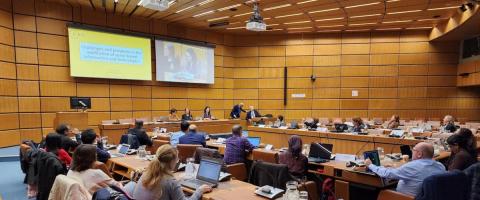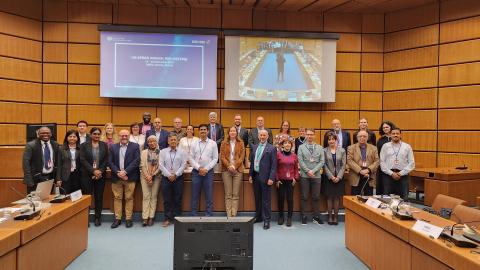
This week, Syslab participated in the 12th Annual UN-SPIDER Regional Support Offices (RSO) Coordination Meeting, which gathered members of this network of centers of expertise in the use of space technology in disaster management. The meeting took place in Vienna, Austria, on 14-16 November 2022, and was organized by the UN-SPIDER Platform of the United Nations Office for Outer Space Affairs (UNOOSA).
RSOs are engaged in supporting activities of UN-SPIDER, such as technical advisory support, rapid mapping during emergency response, preparing specific publications and contents for the knowledge portal, and contributing to UN-SPIDER workshops and conferences. The UN-SPIDER programme currently has 27 RSOs spread across the world.
This meeting brought together a number of organizations. It combined 18 RSOs, representatives for agencies recently visited by the UN-SPIDER Technical Advisory Mission, two observer institutions who are considering joining the network (including CEU), a number of external partners from the private sector, as well as other UN agencies and affiliated partners. UN-SPIDER used this opportunity to present recent and planned activities, outline current challenges, and encourage further participation and contribution by this extensive RSO network. The RSOs and external partners presented their projects and applications and shared other relevant information on ongoing activities and plans.

At this meeting, CEU was represented by Professor Viktor Lagutov from the Department of Environmental Sciences and Policy, supported by recent PhD graduate Anastasia Kvasha, current PhD student Amadeus Dekastle, and master’s students Agnes Widensky, Lovisa Kuehnle-Nelson and Anastasia van der Meer. Professor Lagutov introduced CEU's existing capacities, which could potentially strengthen the network, particularly through supporting UNOOSA in connecting geospatial experts with decision-makers and practitioners. Ongoing projects related to the Systems Laboratory were introduced, including ISEPEI project and OSUN's GeoHub (OSUN Research and Training Hub on Geospatial Technologies) which is undertaken in partnership with the American University of Central Asia and Bard College.
Anastasia Kvasha presented some findings from her recently completed dissertation on challenges and prospects in the application of space-based information and technologies for disaster management. The presentation highlighted the work done in analyzing activations of the satellite-based emergency mapping mechanisms, results of the review of the UN-SPIDER’s Technical Advisory Missions' reports, and identified problems in the diffusion of geospatial technologies and potential solutions to overcome such challenges.
Mobilizing existing platforms and developing CEU’s portfolio in the application of geospatial technologies in support of disaster management, in cooperation with UNOOSA, is an exciting prospect. This would offer new opportunities for students and staff at CEU and continue the university’s engagement with the international community at large.
